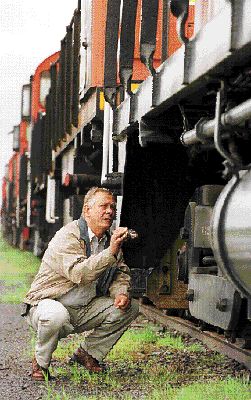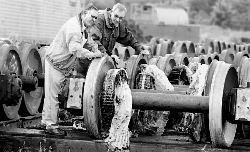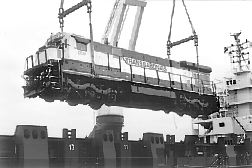|
|
||
|
Monday 7 August 2000
Fast track to success
Former CN employee puts his expertise to work as consultant to rail
industry
The Gazette
"I just met the guy in the lobby of my hotel," Dreckmann said, "and we started talking. Turns out he was a consultant for the U.S. army." Boston Calls Not long after, he got a call from a representative of the Massachusetts Bay Transit Authority, who'd been steered his way by the consultant. It wanted someone to review the maintenance and quality-control program for its locomotives, which had been performing terribly. And by the way, could he also find two railway snowplows, to be delivered to Boston Central Station by Dec. 24? Using a network of contacts developed through his years in the rail industry, Dreckmann was able to track down two unused snowplows owned by Canac International in a railyard in Moncton, N.B., got them refurbished, and delivered them on time six weeks later.
"That was my test. I passed with flying colours." He also got the maintenance contract, which created jobs for four people and lasted the better part of two years. The snowplow episode was the catalyst for a spinoff business - MARCRail Consulting Services Inc. - which Dreckmann and another former CN employee, Mike Allen, launched in 1998. MARCRail brokers deals between companies looking for rail equipment and/or parts and those with items to sell, keeping a small percentage for itself. Got a used dining car? Allen, a freight-car specialist, probably can find a buyer for it. Want to unload some locomotives? Somebody will take them. "Fifty per cent of the time, if someone calls for something, we already know where to look for it," said Allen, 52. One of MARCRail's biggest deals was a recent $3-million sale of five locomotives from a U.S. railroad to TransGabonais, a private rail operator in the African country of Gabon. With new diesel-electric locomotives costing upward of $2.3 million, and older locomotives able to operate for as long as 50 years with occasional overhauls, there is plenty of demand for good used stock, Dreckmann said. And there is supply, too, especially in the U.S., where companies can write off locomotive investments in 15 to 18 years. Dreckmann said his two companies will gross about $4 million U.S. in fees this year. And they're expanding so quickly he'll soon have to leave the basement, move into more conventional office space and perhaps hire someone. To this point, he's had no employees, preferring to subcontract tasks to other self-employed former CN workers that are part of a network he's assembled. Nine months ago, TEMS set up a U.S. office with a partner in Fort Wayne, Ind., which eliminated green-card hassles for U.S. jobs. Europe probably will get a similar division soon. "I don't know what we'll be doing six months from now. Maybe have our own freight-car leasing division," he said. Curiously, most of their business is now in the U.S. They've done work for Via Rail, Bombardier and the Vancouver Wharf, but over-all do relatively little in Canada. "We have clients in Brazil, Sweden, Africa, Europe and Australia," Dreckmann said. Most of the business is generated by word of mouth. A native of Hamburg, Germany, Dreckmann came to Quebec in 1964, knowing not a word of English or French. His older sister Betty had moved to Pointe Claire five years earlier with her husband, Helmut Potter, who'd landed a job as a machinist. But Potter died tragically in a rail-crossing accident in Napierville. "My mother came to the funeral and when she got back to Germany, she thought it would be good if someone from the family went to Canada to help Betty (and her young daughter Angela) adjust to being alone," Dreckmann said. An avid traveler, he was glad to volunteer, immigrating at age 24 with his new bride, Rita, after an eight-month wait for clearance. "What paved the way is that I had a trade. I had apprenticed as an electric technician," he said. They expected to stay two years. "So far, it's 36." Dreckmann got his first job at Macdonald College, where he worked as a maintenance electrician. He moved to CN six months later, and stayed until they eliminated the entire "motive power" department where he worked. "They gave me the option of staying in other jobs, but I didn't want to do seven days a week, afternoon and night shifts any more. I didn't want to go back to that. So I took early retirement," he said. "I do not carry any grudges about being let go. They were very good years and it was a good company. I was a casualty of the times. And my job as a project officer gave me the tools to open these businesses." Downsizing also is a reason there's such demand now for his services, Dreckmann said. Companies that used to take care of maintenance or purchasing in-house now find it more economical to enlist the expertise when needed than to keep someone on staff to do it. "For railroads, it's always better to hire somebody and let them stand outside the box, looking in. Whatever's done daily is considered normal until somebody watching asks 'why are you doing this or that?' " Dreckmann said. He said the niche he's created for himself is as fulfilling as any job he could have imagined. "All my life I've wanted to travel, see other nations and cultures. Now I do it, all over the world, as part of my job. "I have an opportunity of doing what people dream of their whole life. What could be better?" | ||
|
|


